A Hopeful Future
7 – minute read
It feels like my entire teenage and young adult years have been crisis after crisis, while I had a fairly limited ability to change the course of our collective future.
In the last couple of decades, we’ve lived through the war on terror and experienced ‘the great recession‘ in ’08-’10. We see the impending threat of a climate crisis, and there is an increasingly polarised global community. All those worries feel dwarfed, living in times of COVID-19.
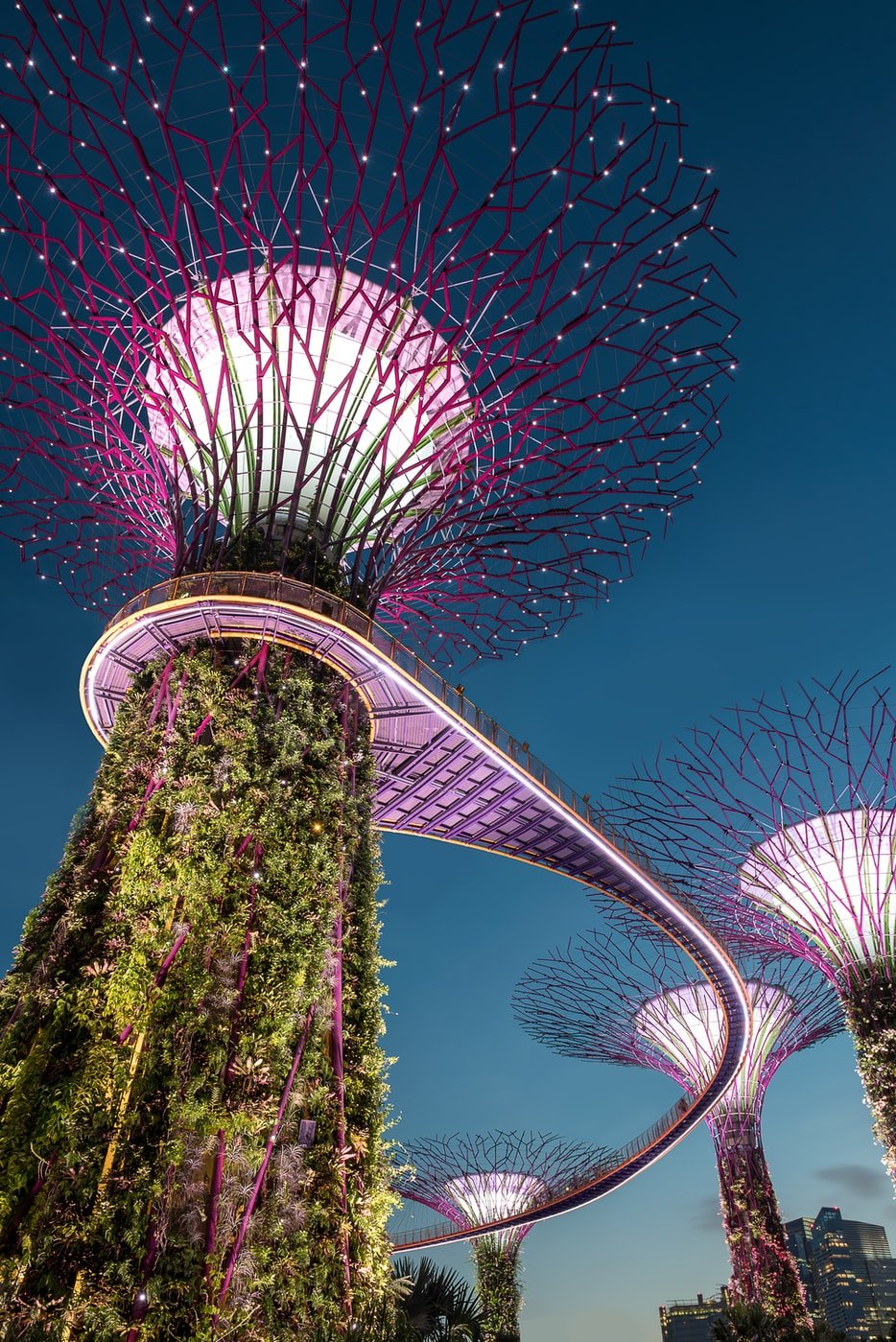
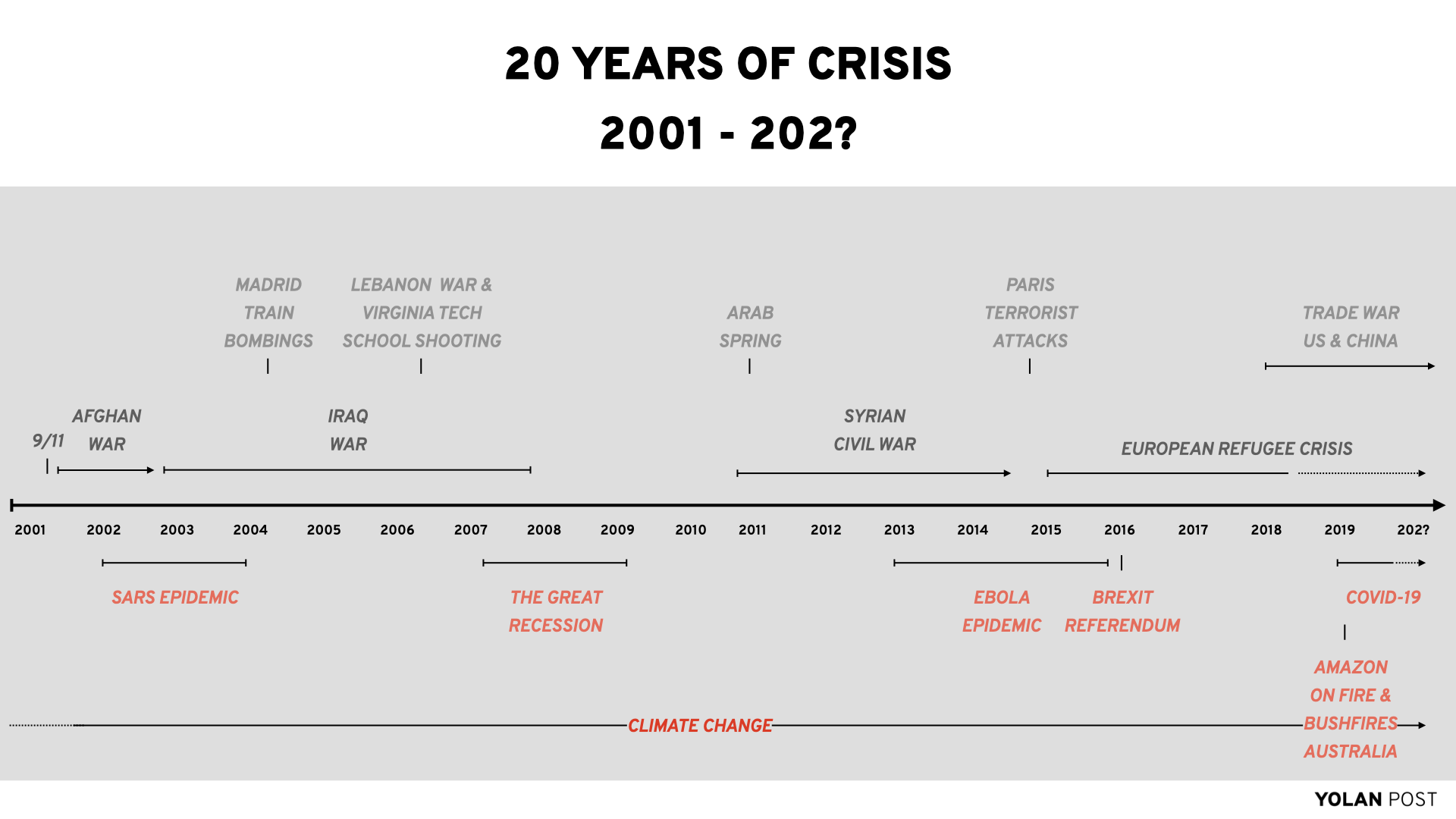
This is why: generational theory
Generational theory believes that history repeats itself, just like the seasons come and go in a cyclical order. The authors of this theory coined the term millennial and generation Z.
Seasons
- Spring
- Summer
- Autumn
- Winter
- Repeat.
History, according to generational theory
- High Era
- Awakening Era
- Unraveling Era
- Crisis Era
- Repeat.
How do we cope with the convergence of a health crisis, economic crisis, climate crisis, and political crisis? And is there light at the end of the tunnel?
I believe there is.
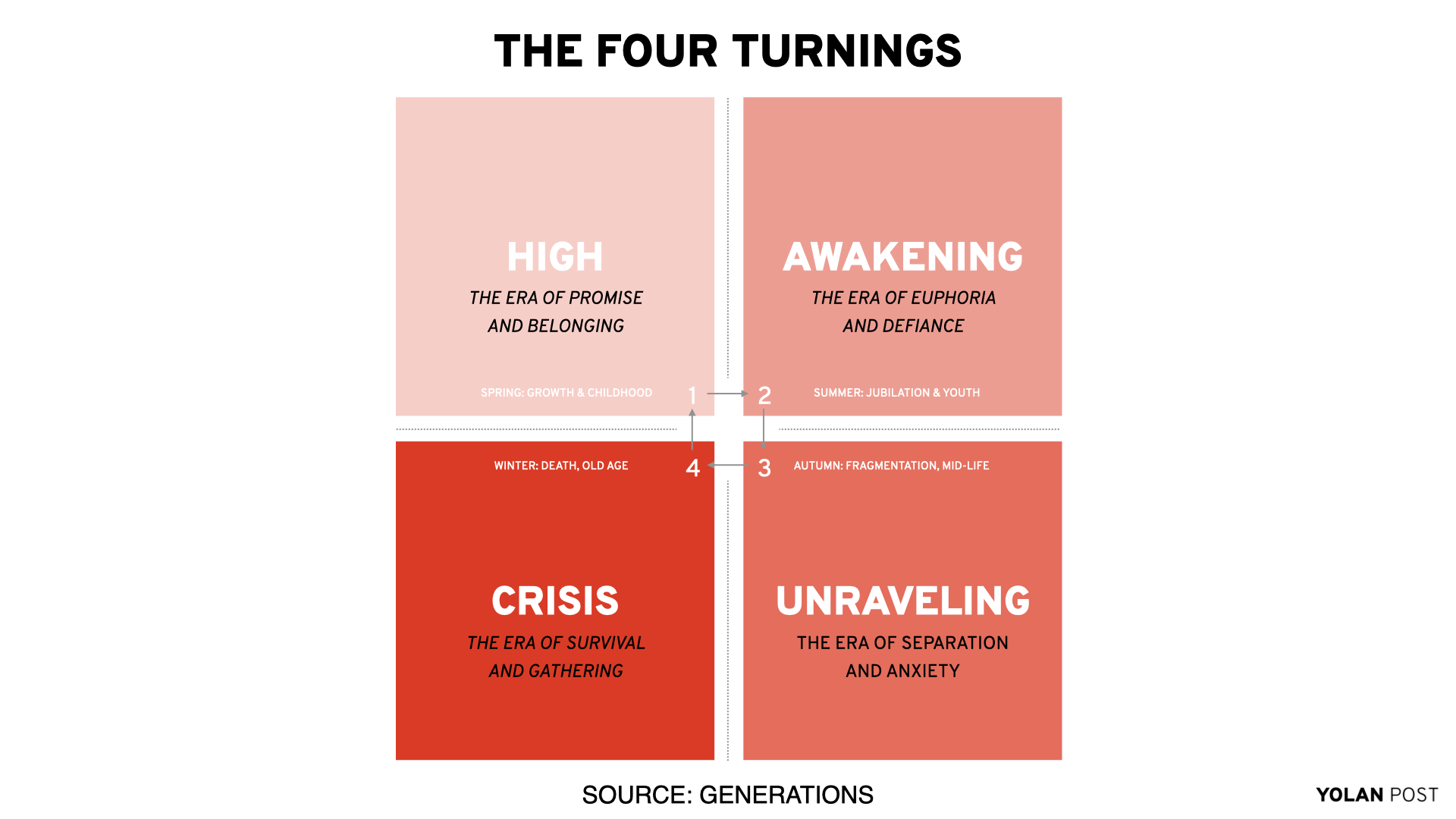
Each of these eras follows a specific pattern and causes the next season to begin.
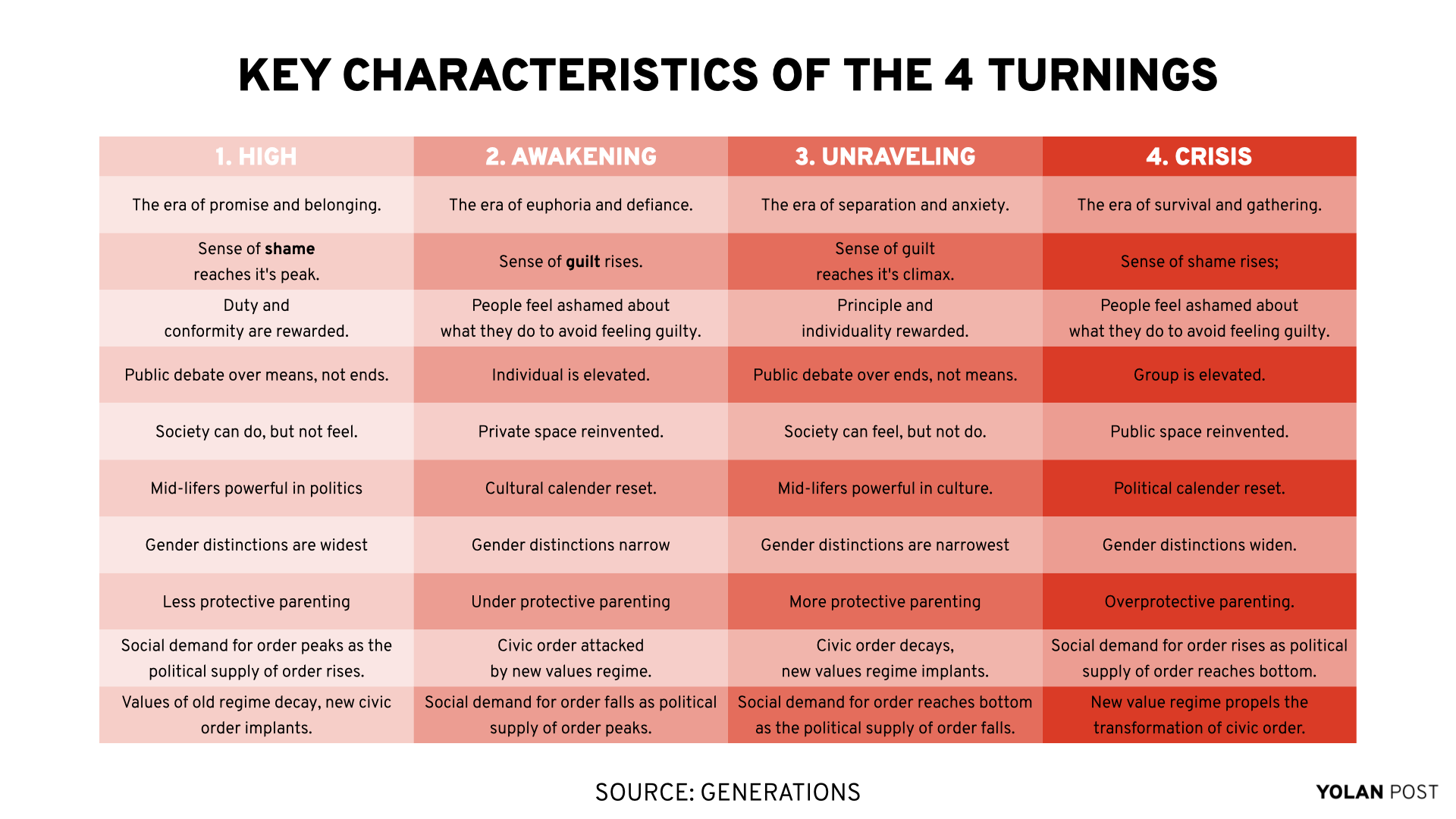
The four seasons
The last crisis era that caused a globally shared experience was World War II. For many, it was a fight for survival. While it simultaneously brought people together to fight for a different future than Nazi Germany, and their allies, were aiming for.
The end of this era caused a new high era. It was marked by a boom in wealth, prosperity, and a boom in childbirth. The generation born into this high era is now known as the baby boomers (prophet archetype).
During the subsequent awakening era, the consciousness revolution came to pass. This era is known for: its counter culture, the civil rights movement with equal rights movements (a.o. Martin Luther King, Abortion Laws), the rise of feminism, and environmentalism. And the hippie movement, emphasizing peace, love, and happiness and peaking with the Summer Of Love in 1967. Generation X (the nomad archetype) is born in this era.
The unraveling era was characterized by a.o. Multiculturalism. This led to a clash of cultures. A conflict of ideas about the ways societies should respond to cultural (and religious) differences. Millennials (the civic archetype) were born into an era where people fight for political correctness, while the N.W.A. simultaneously screams Fuck Tha Police.
THE PREVIOUS ERA
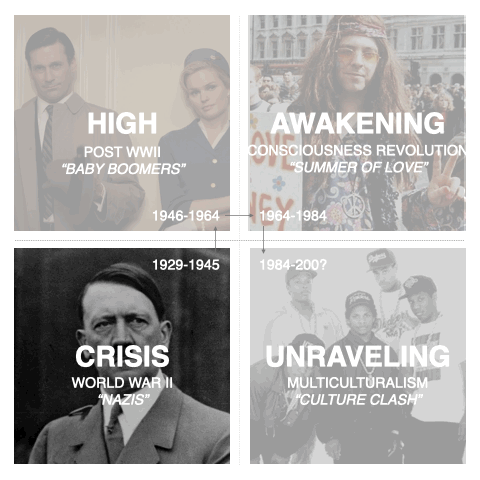
Enter the new crisis era
Around the year 2001, the new crisis-era kicks off, and anxiousness reaches its peak: war on terror, growing anxiety on climate change, and political and financial crises rock the world. This is the era in which Gen-Z (The Artist archetype) is born.
Gen-Z is born into a world were institutions like education, healthcare, and press are defunded.
The press is depending on click-bait revenue streams, and quality journalism has become a difficult business model. They are flooding the world with enraging stories, conspiracy theories, fake news, and opinion statements to drive traffic and revenue, while factual statements spread slowly and difficultly.
Education is not sexy and the least innovative industry in the world.
The poor quality of education laid bare to parents watching in on their kid’s zoom classes.
And hospitals constantly lack the amounts of qualified personnel necessary.
These weaknesses have become painfully clear during the COVID-19 crisis.
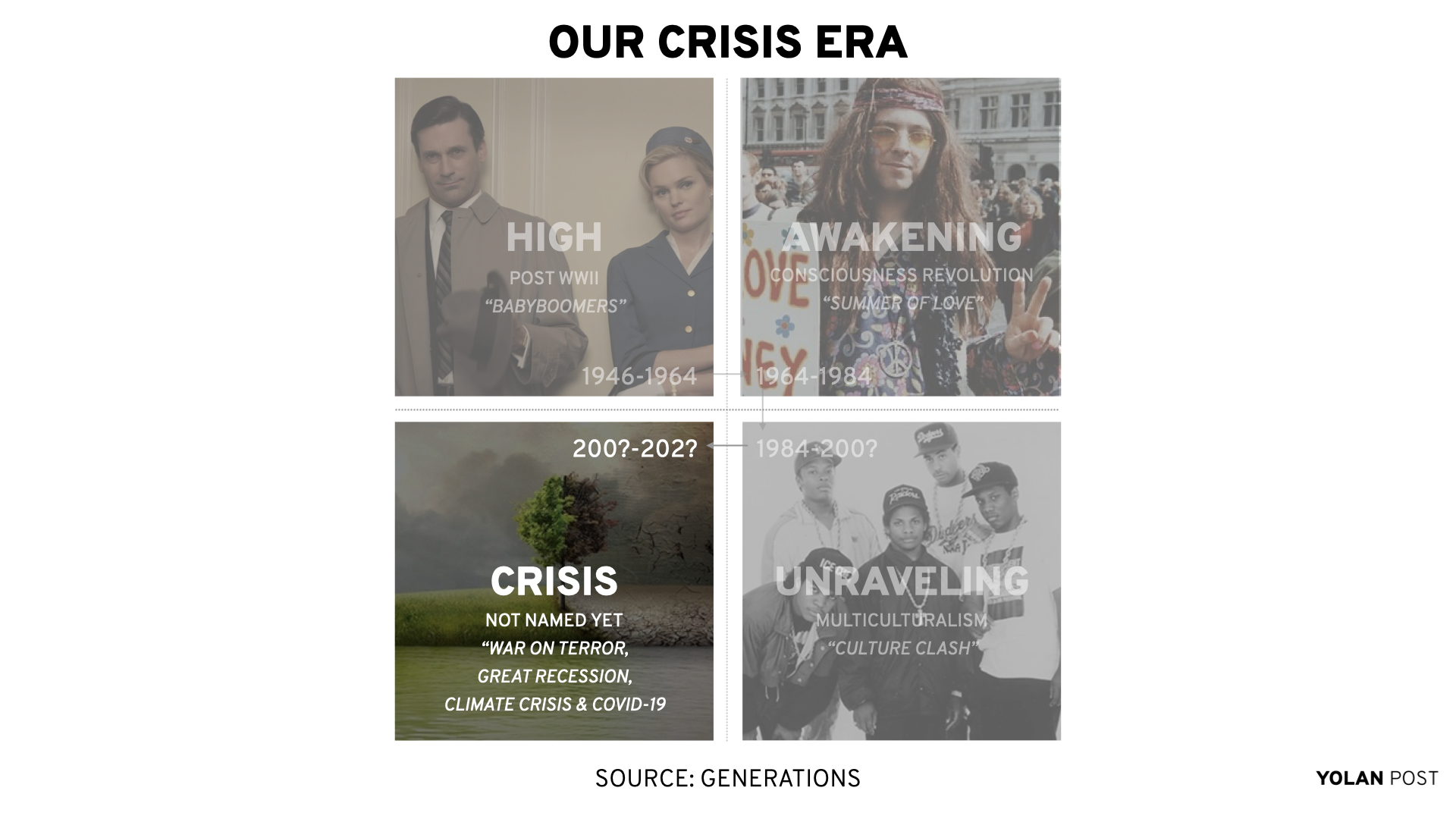
From childhood to elderhood
The average person alive today will live through all of the four seasons of generational theory (High/Awakening/Unraveling/Crisis). The era that you’re born in will shape what your generations’ future path looks like.
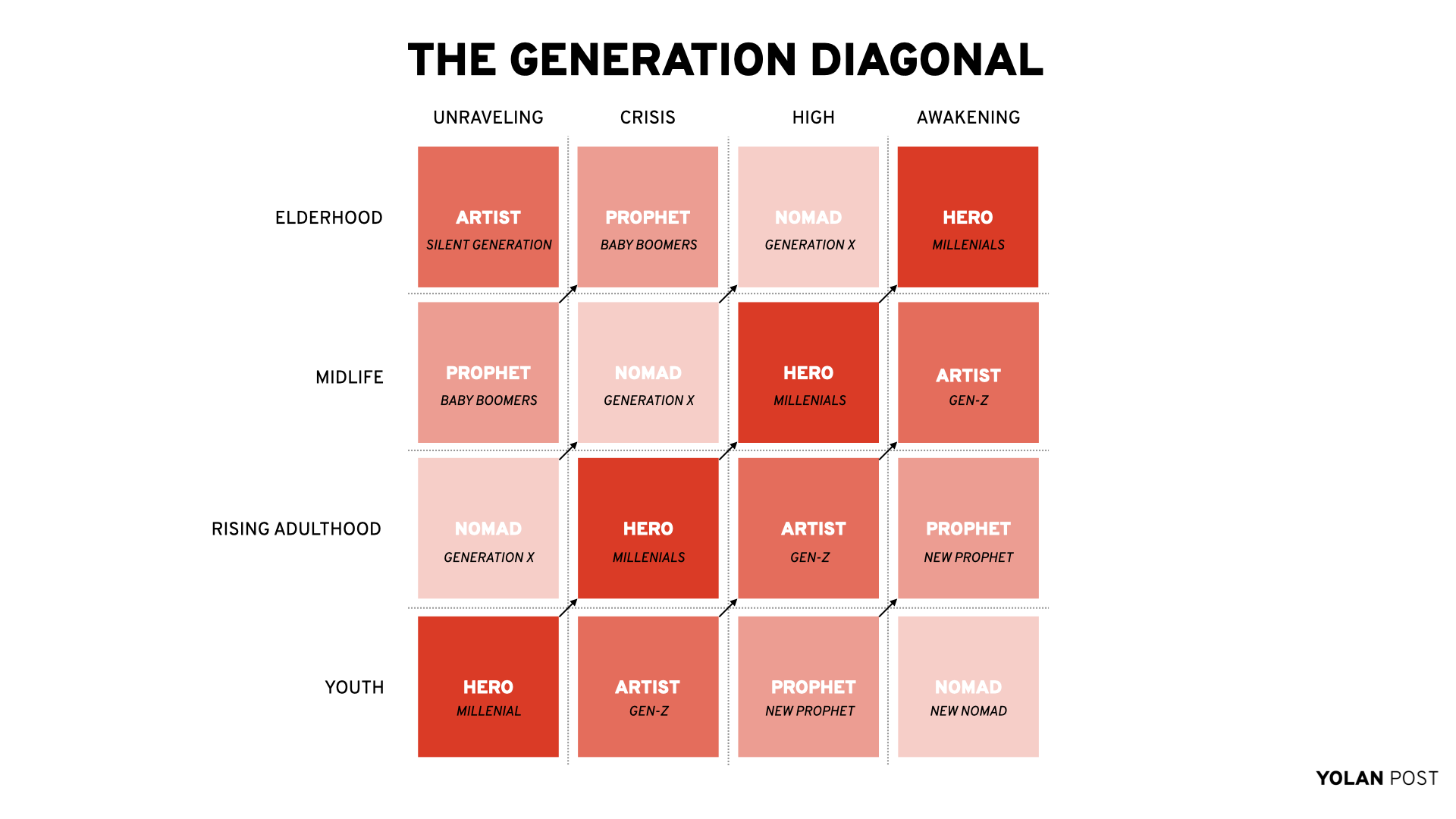
For example, the Millennials were born in an unraveling era: the era of Michael Jackson’s Earth Song and Madonna’s Like A Prayer.
They come of age in the crisis-era: 9/11, the war on terror, increasing polarisation, Brexit, climate crisis, the great recession of ’08-’10, and the COVID-19 crisis.
And Millennials come into positions of power during their midlives in the new high era. Through elderhood, they experience a new awakening era.
Generational Archetypes and Virtues
Each generation also grows up with different virtues that correspond with their ‘archetype.’
- An awakening era (Idealists coming of age) triggers cultural creativity and new ideals, as the emergence of a spiritual awakening challenges institutions built around old values.
- In an unraveling era (Reactives coming of age) individualism flourishes, new ideals are cultivated, confidence in institutions declines to an all-time low, and worldly problems are postponed.
- A crisis-era (Civics coming of age) opens with growing collective unity in the face of perceived social peril and culminates in a worldy crisis in which danger is overcome and one set of new ideals triumphs.
- In a high era (Adaptives coming of age) society turns toward conformity and stability, triumphant ideals are institutionalized, and spiritual discontent is delayed.
The Millennial generation grew up with civic virtues, such as equality, optimism, cooperation, and community.
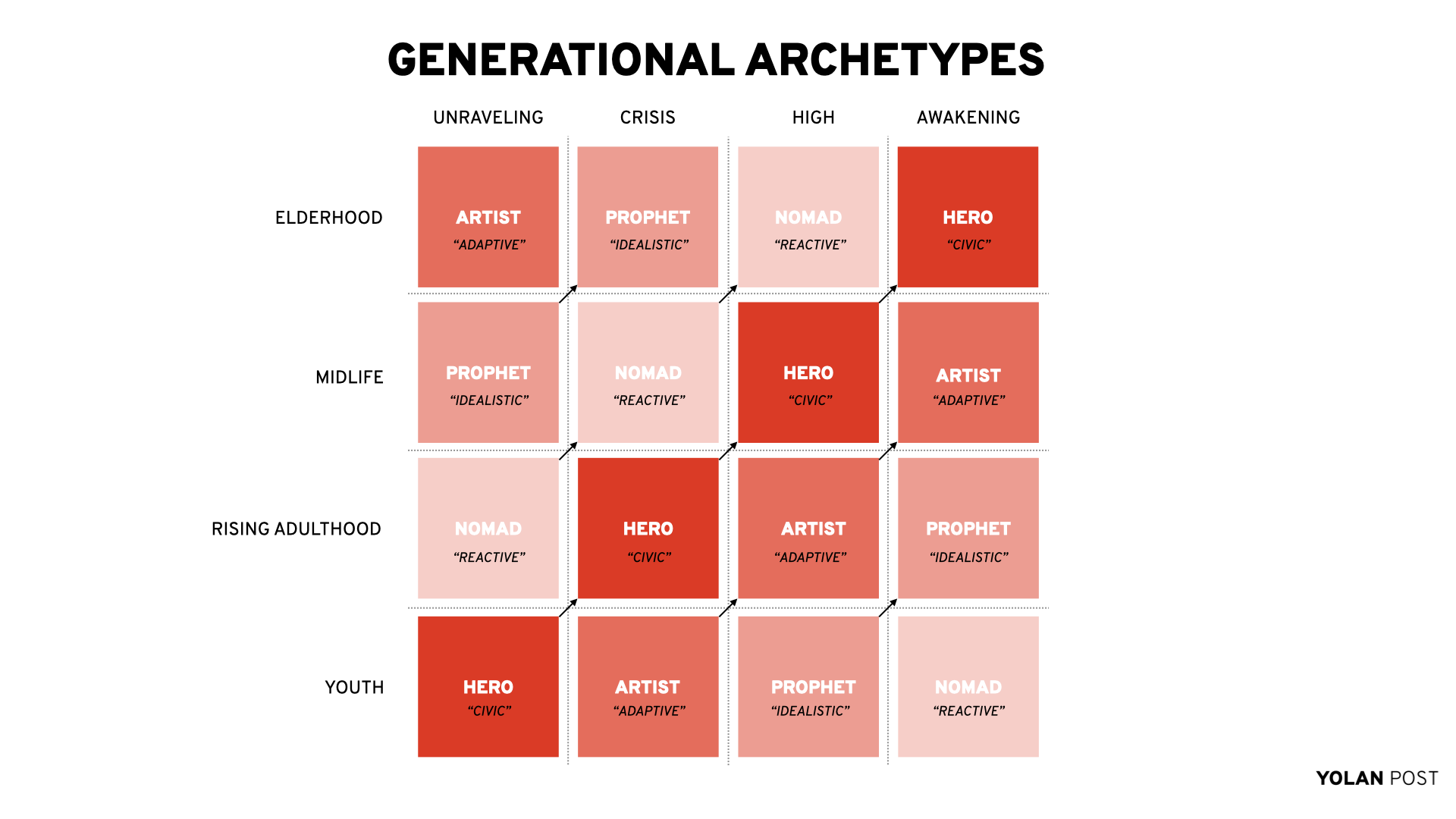
A generation of heroes
Millennials (hero archetype) show every sign of being a generation that trends towards improving education and health care, strengthening families, more adult affection and protection, and a rising sense that youths need a national mission.
Predicting the future for Millenials (according to Generational Theory):
“Millennials band together at a historic moment, and guided by the principled wisdom of elder Idealists and the realistic leadership of midlife Reactives, and they successfully shoulder a worldy crisis.
You are here ?
It’s my strong conviction that we are nearing the tipping point between the crisis-era and the high era. Almost 20 years have passed, and the millennial generation is entering leadership roles, making it possible to drive change.
At this moment in time, we have the once in a lifetime ability to frame the 20+ years to come. Millennials can set a new framework to resolve the crises we’re facing, or delay it and keep the framework of the previous generation guiding our actions.
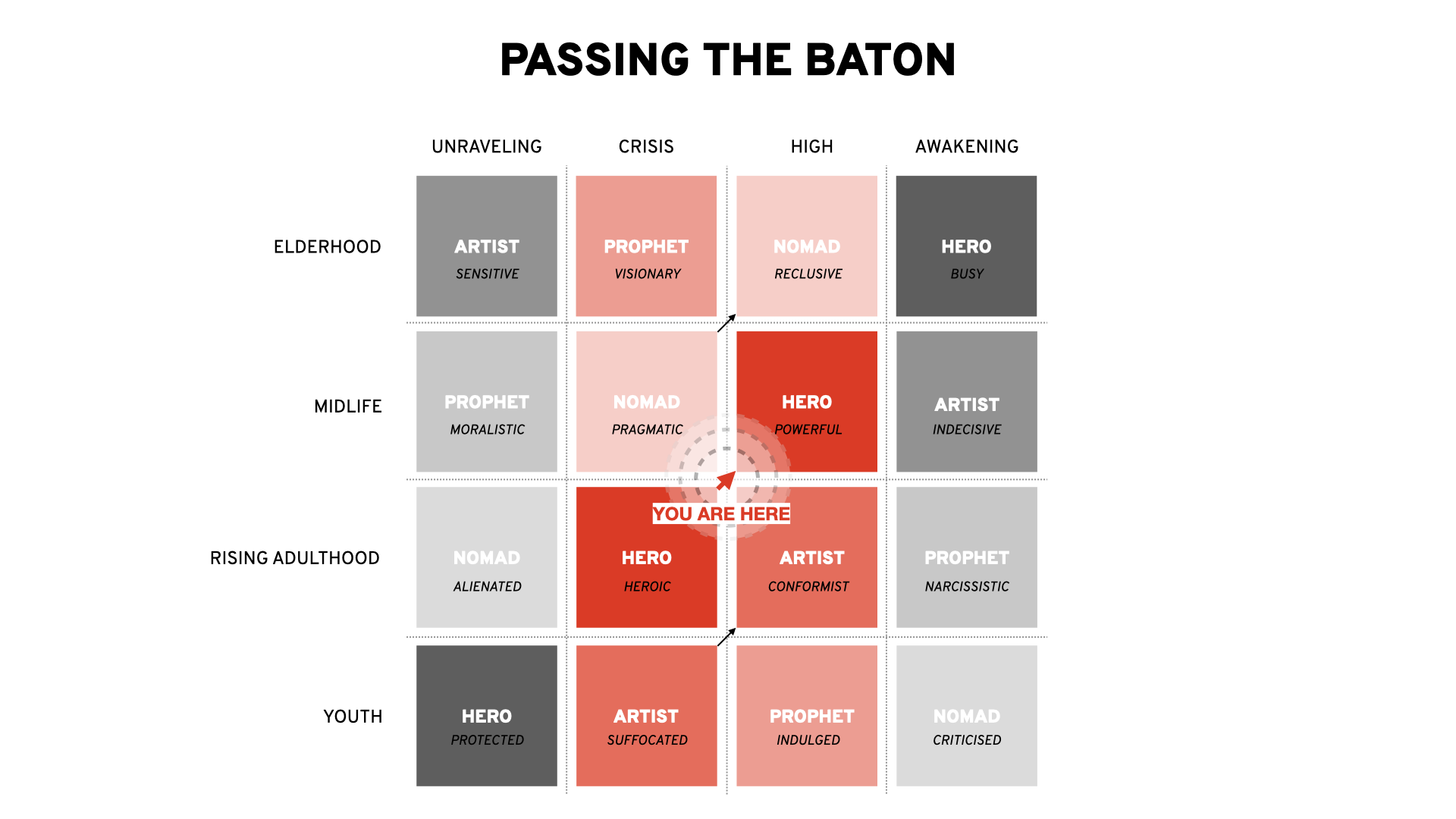
My hope for the future…
My hope of the future is in line with the framework of Jeremy Rifkin’s Third Industrial Revolution. Rifkin believes that the sun is setting on the Second Industrial Revolution. He advises the European Union, Germany, and China on how to accelerate the future to a new high era called the third industrial revolution.
Definition Industrial Revolution:
“An industrial Revolution is the converging of energy, transport, and communication technology. To power, move, and manage economic life.”
The second industrial revolution framework was all about centralized, closed, and proprietary, for example, centralized power management, and centralized banking.
Three converging technologies drove this:
- Energy Technology: oil and nuclear,
- Transport Technology: combustion engines in cars, planes, and trucks,
- Communication Technology: telephone, television, and radio
The third industrial revolution’s framework is all about distributed instead of centralized. Collaborative, open, and transparent.
This will be driven by three new converging technologies:
- Energy Technology: renewable energy such as wind and solar,
- Transport Technology: electric engines in cars, planes, and trucks,
- Communication Technology: the internet.
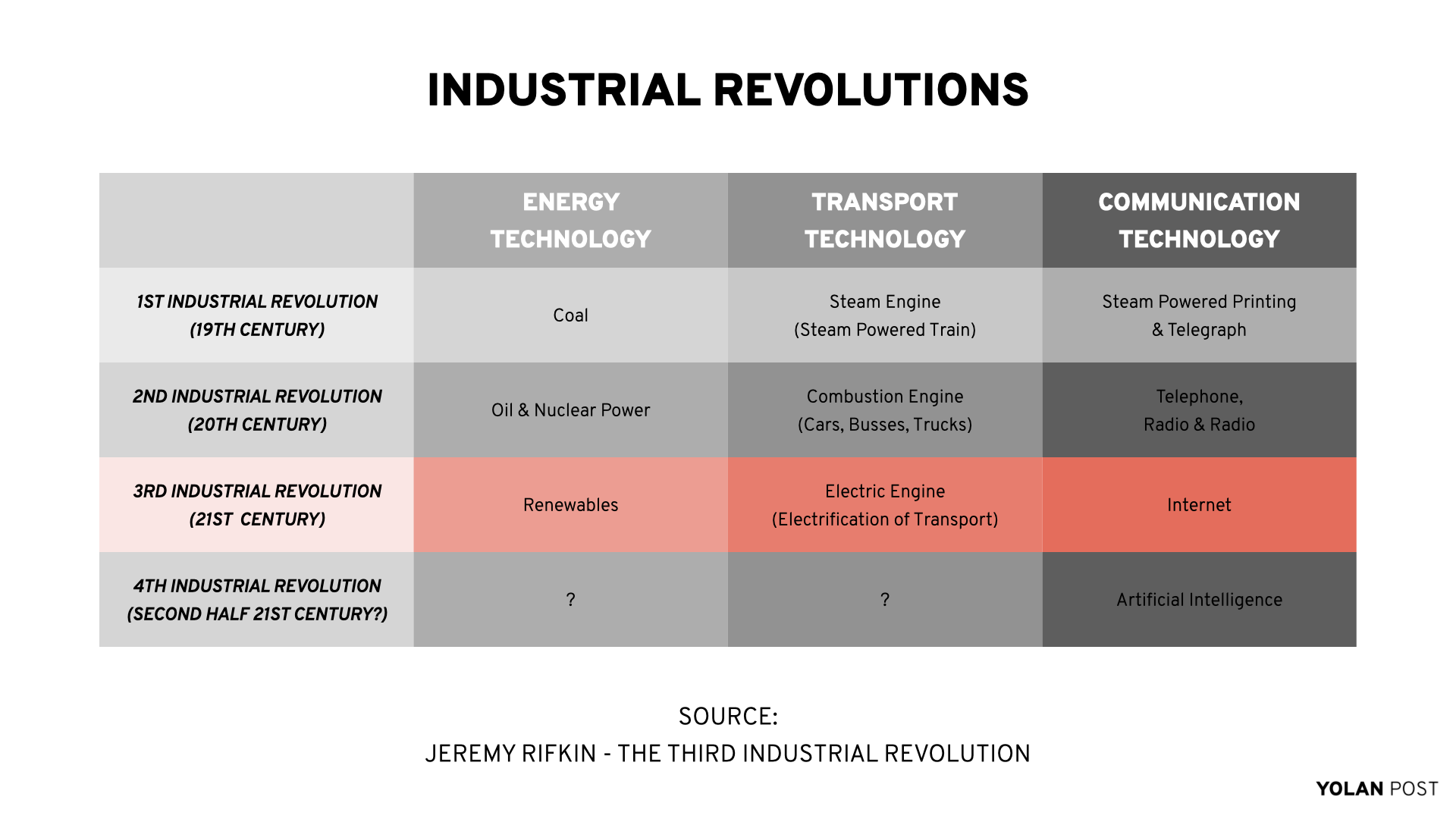
…but hope is not a strategy.
In my mind, the old ways of doing things just don’t work anymore.
The battle in front of us is how we want to shape our future.
The future is full of hope, but it will not come to pass without hard work and action.
So, I will dedicate more of my time and skills to make it happen. And more importantly, I want to build (or become part of) a community with whom we can do that collectively.
Thoughts? Leave a comment.
